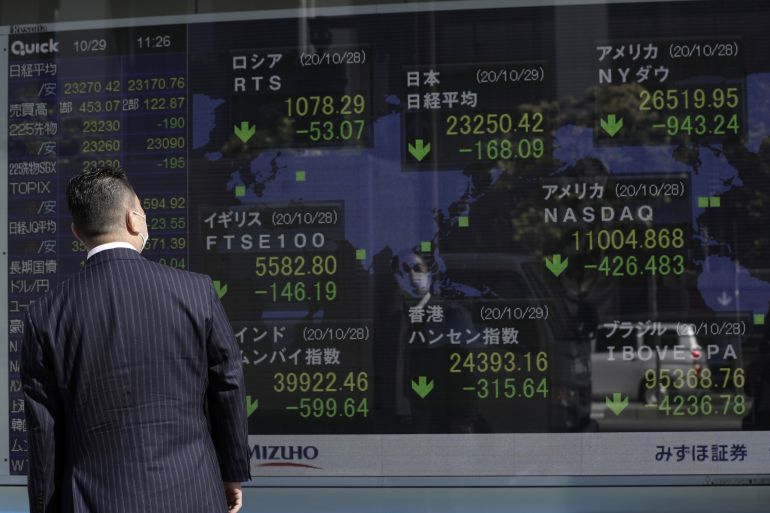As persisting concerns about the Federal Reserve’s tightening and weaker-than-expected economic and profit data weighed on confidence ahead of a Fed policy meeting next week, Asian stock markets fell on Friday, matching losses on Wall Street.

MSCI’s broadest index of Asia-Pacific shares outside Japan (.MIAPJ0000PUS) lost 1.3 percent, led by a 2.34 percent drop in Australian shares (.AXJO), while Japan’s Nikkei stock index (.N225) fell 1.47 percent.
In Asian trade, Nasdaq futures fell 1.2 percent after Netflix Inc forecasted dismal first-quarter subscriber growth after the close. The S&P 500 e-minis fell 0.68 percent.
In Europe, the decline was expected to continue. The Euro Stoxx 50 futures were down 1.84 percent in early European dealings, while the FTSE futures were down 1.34 percent.
The Nasdaq (.IXIC) fell 1.3 percent late in the U.S. session as investors awaited the Fed’s FOMC meeting next week for clarity on how it plans to deal with high inflation.
The changes spread to Chinese stocks, with the Hong Kong benchmark (.HSI) falling 0.75 percent after posting its best day in six months the day before, and Chinese blue chips (.CSI300) falling 0.8 percent after reporting gains the day before.
China lowered its benchmark mortgage rates on Thursday, the latest action in a flurry of monetary easing aimed at bolstering an economy beset by a failing housing market and concerns over the Omicron coronavirus variety.
China proposes to decrease interest rates on loans from its main lending program

According to three sources with direct knowledge of the situation, China will slash interest rates on a key monetary policy tool via which financial firms can acquire temporary liquidity from the central bank on Friday.
The 10-basis-point fall in the People’s Bank of China’s (PBOC) standing lending facility (SLF) loans comes after a series of important interest rate cuts as Beijing eases monetary policies to stabilize a weakening economy.
Cuts to benchmark lending rates, according to Nomura analysts, will have a limited impact since the cuts are too tiny to have a significant impact.
According to Kyle Rodda, a market analyst at IG Markets, market sentiment was further harmed by comments made by US Treasury Secretary Janet Yellen on inflation.
On Thursday, Yellen expressed confidence that the Federal Reserve and the Biden administration would take the necessary steps to reduce inflation by 2022 if the COVID-19 epidemic is contained.
Oil prices are falling as a result of profit-taking in the United States
Oil prices fell on Friday after reaching seven-year highs earlier in the week, as a surge in US crude and fuel stockpiles encouraged investors to cash in on the rally.
Also Read: What is Oil Trading – Guide
Crude oil in the United States fell by 1.99% to $83.85 per barrel. The price of Brent crude has dropped to $86.82 per barrel. Both benchmarks have risen more than 10% so far this year, owing to supply concerns.
U.S. Treasury rates were marginally lower across the curve after rising substantially earlier in the week as investors braced for the possibility of the Federal Reserve tightening monetary policy more aggressively to combat inflation.
After hitting a two-year high of 1.902 percent on Wednesday, yields on benchmark 10-year notes were last at 1.7737 percent, the lowest in a week.
Earlier in the week, rising yields aided the dollar’s gains, but on Friday, the dollar index fell 0.08 percent against a basket of six major currencies.
The dollar, on the other hand, lost ground against the safe-haven yen, plunging to a one-week low of 113.8 per dollar, while the riskier Australian dollar fell 0.5 percent.
Gold futures rose 0.2 percent to $1,841.48 an ounce.
